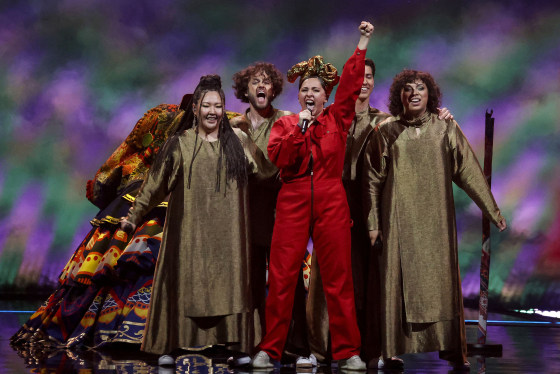Within hours of bombs falling on Ukraine, major world sports and cultural institutions moved to isolate Russian athletes and artists — banning them from platforms that have long brought glory to Vladimir Putin's regime.
Organizers of the wildly popular Eurovision music contest were one of the latest to take action against Moscow on Friday, kicking out Russia from the annual competition that features colorful acts from across the continent.
“I was honestly very surprised by this,” said Simon Miles, a professor at Duke University’s Sanford School of Public Policy and author of “Engaging the Evil Empire: Washington, Moscow, and the Beginning of the End of the Cold War.” “Eurovision has gone forward with some very unsavory countries participating in the past.”
Recent military clashes involving Armenia and Azerbaijan or Georgia and Russia didn’t have any impact on Eurovision producers, he said.
In general, sports and cultural officials have long loathed to ban participants based on international news off the stage and field, but Russia's invasion of Ukraine has pushed many of these institutions to take a stand.
“Given our norms today, this is such a gross violation of what we see as our humanity that we’re going to react that way," said Matthew Schmidt, a professor of national security and political science at the University of New Haven who specializes in Russian affairs.
“I mean what do sports teams do? What does it mean to go to a sports event? We get together with all of these other human beings and we share something that is collective," he said. "We feel violated right now. That collective experience has been violated.”
The laundry list of event organizers and team officials taking action against Russia is growing quickly. Among the notable are:
- The International Olympic Committee on Friday urged world sports bodies to move competitions out of Russia and Belarus. The Republic of Belarus is governed by Alexander Lukashenko, a Putin ally who has given shelter to Russian forces as they invade Ukraine from the north.
- The governing body of European soccer moved its biggest match, the Champions League final in May, from St. Petersburg to Paris.
- The soccer federations of Poland, Sweden and the Czech Republic said they'll refuse to play in upcoming World Cup qualifying matches in Russia.
- German soccer club Schalke removed the logo of its main sponsor, Russian state-owned energy powerhouse Gazprom, from player jerseys.
- Manchester United, one of the world's most famous soccer teams, severed its sponsorship deal with Russian airline Aeroflot.
- Conductor Valery Gergiev, a long-time friend of Putin’s, will not lead the Vienna Philharmonic in a five-concert U.S. tour that starts at Carnegie Hall on Friday night. “This change was made due to recent world events,” Carnegie Hall spokeswoman Synneve Carlino said.
Russian athletes, artists and institutions occupying such prominent spaces has long fueled Putin's vision of Russian exceptionalism, Miles said.
"This is really core to the identity of Russia that Putin wants to project," Miles said. "That it's culturally refined, which it is, and powerful."
Some Russian athletes joined in reacting to the country's invasion of Ukraine, with Moscow-born tennis star Andrey Rublev scrawling "No war please" on the lens of a camera at a tennis competition in Dubai.
While examples of dissent are often few and far between in Putin's Russia, the growing internal anti-war movement could be having an outsized impact.
Miles said he was particularly moved by TV host Ivan Urgant, who he called "Russian Jimmy Fallon," for voicing protest of the invasion on social media.
"His show is on Russian state TV, his entire livelihood is on Russian state TV and there's no way he doesn't pay a price for that," Miles said.
Whether the swift action aimed at making Russia an international sports and arts pariah will have any impact on Putin’s aggression against Ukraine is debatable.
The isolation of South African sports during apartheid played a key role in that racist system's collapse, said Dan Lebowitz, executive director of Northeastern University’s Center for the Study of Sport in Society.
"As global citizens, as we watch the unbelievably horrific tragedy happening in Ukraine, in our most hopeful selves, we hope that sport will have that same impact [like with South Africa] and the exclusion from those stages will create a dynamic where this war will be de-escalated," said Lebowitz. "But there’s always a difference between hopefulness and reality."

